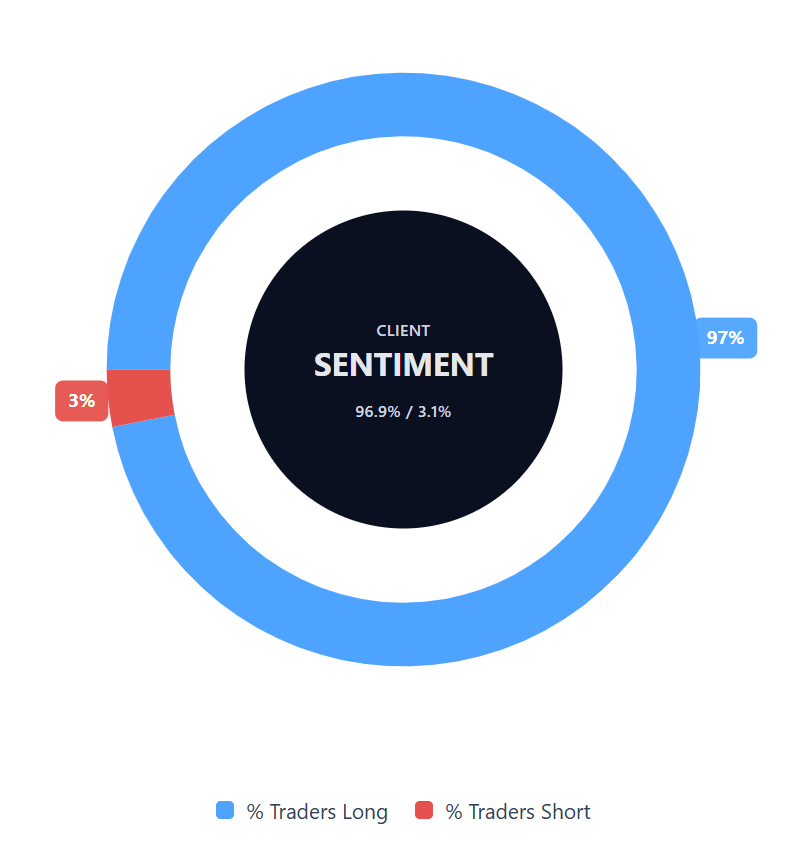Salesforce stock forecast: Third-party targets
Salesforce (CRM) was trading at $254.05 in early trading on 10 September, after moving within an intraday range of $252.05 to $254.20.
The stock is still down more than 20% year-to-date, making it one of the Dow’s weaker performers, despite beating Q2 earnings expectations with $10.2bn in revenue. Meanwhile, 96.94% of Capital.com clients hold buy positions in CRM CFDs.
Support comes from a softer US dollar as traders position for potential Federal Reserve rate cuts following weak labour market data, with the DXY holding near 97.8 as markets price in a 90% probability of a 25-basis-point cut next week. Sentiment also reflects ongoing pressure on enterprise software spending, with many businesses delaying large IT projects due to macroeconomic uncertainty.
Trading volume remains subdued as investors await key inflation data ahead of the Fed’s 16–17 September meeting, with producer prices due later today and consumer prices on Thursday (Reuters, 7 September 2025).
Salesforce share price forecast: Analyst price target view
Bernstein (investment research)
Bernstein analyst Mark Moerdler set a $221 price target on 4 September 2025.
UBS (equity research)
UBS analyst Karl Keirstead lowered the target from $300 to $260 on 28 August 2025, with a Neutral rating. UBS flagged a drawn-out Informatica integration, with acceleration not expected until fiscal 2027, and noted distribution capacity challenges unchanged for two years.
Barclays (investment bank)
Barclays analyst Raimo Lenschow cut the target to $316 from $347 on 22 August 2025, maintaining an Overweight rating. Barclays said Q2 earnings were a key test for software valuations, though positive channel checks indicated strong end-user demand.
Goldman Sachs (investment bank)
Goldman Sachs analyst Kash Rangan reiterated a Buy rating with a $385 target on 8 September 2025. Goldman cited AI as a structural growth driver rather than a disruption to Salesforce’s SaaS model, highlighting Data Cloud growth of 120% year-on-year and 6,000 paid Agentforce agreements.
Morgan Stanley (investment bank)
Morgan Stanley analyst Keith Weiss raised the target from $404 to $405 on 6 September 2025, with an Overweight rating.
Predictions and third-party forecasts are frequently inaccurate, as they cannot account for unforeseen events. CFDs are complex instruments and carry a high risk of losing money rapidly due to leverage. Consider whether you understand how CFDs work and whether you can afford to take this risk.
Past performance isn’t a reliable indicator of future results.
CRM stock price: Technical overview
On the daily chart, Salesforce trades at $254.05 as of 12:57 UTC. It remains below its key moving average cluster, with the 20/50/100/200-day SMAs at approximately 247, 255, 263 and 288. The stock sits above shorter-term averages but faces resistance at the 50-day line. Momentum is mixed: the 14-day RSI is at 51.48 (neutral), while the ADX at 17.44 signals weak trend strength.
This technical analysis is provided for information only. It does not constitute financial advice or a recommendation to trade. Data correct as of 10 September 2025.
Capital.com’s client sentiment for Salesforce CFDs
Capital.com data (10 September 2025) shows 96.9% of Salesforce CFD positions are long, compared with 3.3% short, leaving buyers ahead by 93.6 percentage points. This reflects current open positions and may change at any time.

FAQ
Who owns the most Salesforce stock?
Institutional investors hold most Salesforce shares. Vanguard Group (9.33%) and BlackRock (8.57%) are the two largest shareholders as of September 2025. Co-founder and CEO Marc Benioff remains the biggest individual holder, with around 3.36% (WallStreetZen, 10 September 2025).
What is the 5 year forecast for Salesforce stock?
Analyst forecasts for Salesforce vary, ranging from $221 to $405 as of late August 2025. Longer-term projections often reference AI adoption, acquisitions and competition in the mature CRM sector. Forecasts remain uncertain and depend on wider market and economic conditions.
Is Salesforce a good stock to buy?
Suitability depends on personal goals and risk tolerance. Analysts are divided, with some pointing to AI-driven growth potential and others highlighting integration challenges and slowing enterprise spending. Independent research and alignment with personal strategy are essential.
Could Salesforce stock go up or down?
The stock may rise or fall based on earnings results, product launches, competitor actions and macroeconomic factors. Possible upside could come from stronger AI demand, while risks include costly acquisitions and weaker enterprise spending.
Should I invest in Salesforce stock?
Any decision will depend on your objectives, time horizon and risk appetite. Some traders use salesforce CFDs to speculate on price moves without owning the shares. CFDs are leveraged instruments and can result in rapid losses, so ensure your approach matches your strategy and risk management.